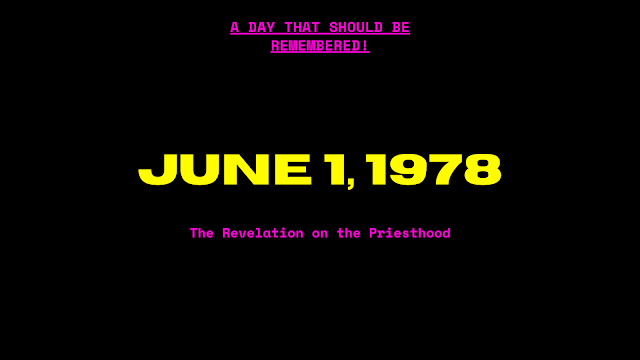I remember that June day in 1978 when all worthy men were allowed to hold the priesthood. It is etched in my memory.
At 16, I was old enough to be fully cognizant and aware of the events and the implications.
Even at that age, I was an avid newspaper reader. I read two major daily papers and several weekly papers cover-to-cover.
Some events stuck in my mind:
1. It came out of nowhere.
2. There was some opposition that was formal and organized. Some opposition was personal and informal.
The people who opposed it largely kept it to themselves, families, friends, or known like-minded others.
3. One last observation
I've avoided writing this post for years, actually. I didn't want to rehearse or give any credence to the mythologies, rationales, folklore or downright cruelty that blacks, and especially black members, have suffered over the years.
Long before the Internet, it was difficult to find sources for quotes or positions. Generally, you had to find them in a book or ask someone who had access to the hard-copy record(s).
This was hard. Most people weren't motivated to do this, but I was. I would approach the highest-ranking church leaders and scholars I encountered and asked them my questions about why blacks were barred from the priesthood.
When questioned directly, most would hedge. When I pressed them for the source of their belief or conviction, I invariably got told that it was simply their opinion.
I remember thinking, "They don't know." "Nobody knows." The Church never gave any official rationale for this practice. It was people and their opinions that muddied the waters so badly.
This is an incredible incentive not to speculate on anything, now or ever.
However, I want to point out one small caveat concerning the prevalent mythology, now completely discredited, that blacks earned their black skin in the pre-mortal life by not being valiant.
This belief could never have been believed or spread widely if it hadn't been tied to behavior of some sort, albeit behavior in the pre-mortal life. Blacks have always been deity in embryo just like the rest of us.
As children of our Heavenly Father, they have always carried the seeds of deity within them just like everyone else.
The notion that blacks were somehow inferior could never have gained credence alone. It had to be tied to behavior or members would never have found it believable.
Conclusion
Elder Ahmad S. Corbitt, currently serving in the Sunday School General Presidency wrote a series of essays that can be accessed on the Church's History website. They are well worth your time:
Revelations in the Summer of 1978
A Personal Essay on Race and the Priesthood, Part 1
Seeing as We Are Seen
A Personal Essay on Race and the Priesthood, Part 2
He makes a compelling case for the point that the Book of Mormon is truly a story of triumph over racial and cultural categories and divisions.
We really can be one!
Continue reading at the original source →




